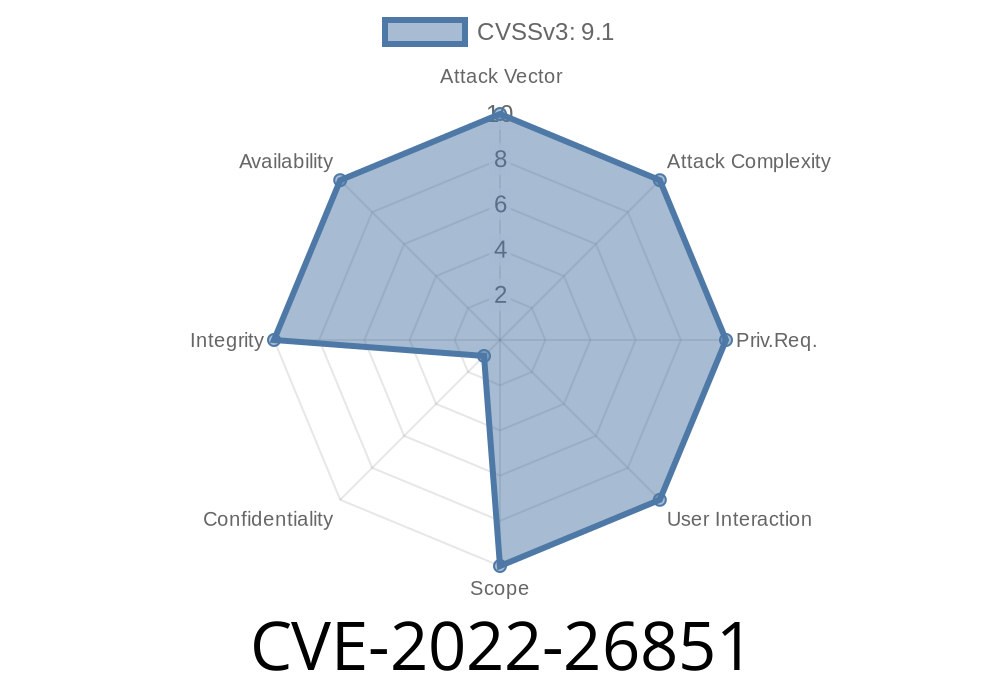---
Dell's PowerScale OneFS is a popular file storage platform in enterprise environments. But like any system, it's not immune to security flaws. One notable bug, CVE-2022-26851, affects certain versions (8.2.2 to 9.3.x) and can have severe consequences if exploited, potentially allowing attackers to tamper with or erase important files. In this long read, we’ll unpack what the vulnerability is, how it can be exploited, and what steps you should take to protect your data.
What Is CVE-2022-26851?
CVE-2022-26851 is a vulnerability found in Dell PowerScale OneFS (8.2.2-9.3.x) related to predictable file naming from observable state. This means that when OneFS creates files, their names can be guessed by someone watching the system's state or traffic. If an attacker can predict the next file name, they might be able to:
Create files where they shouldn’t be able to
The risk is high when attackers are unprivileged network users but have access to the affected system.
The Technical Details
The root of this vulnerability lies in how OneFS generates file names based on a state that can be observed by anyone with access to certain information, such as timestamps, session IDs, or incremental counters.
Suppose OneFS creates temporary or session files using a pattern like this
/ifs/.sessiondata/session_<session_id>_tempfile_<number>
If the <session_id> and <number> are predictable (e.g., <number> just increments by 1 every time), it's possible for someone to figure out what the next file name will be.
To illustrate, here’s a very simple pseudo-code
# BAD: Predictable naming based on observable count
import time
def generate_filename(user_id):
timestamp = int(time.time())
filename = f"/ifs/.sessiondata/temp_{user_id}_{timestamp}"
return filename
If the user_id is easy to discover (common, sequential, or based on login names) and the timestamp is just the system time, an attacker could just guess the current timestamp or try a range of recent timestamps to find or create files.
Step 1: Observe State
Suppose an attacker monitors client requests and notices that a new session file is created every time a user logs in, with a name like temp_1001_1717014365.
Step 2: Predict Next File
By enrolling as a regular (low-privilege) user, the attacker can log in themselves and note their own file name:
/ifs/.sessiondata/temp_2002_171701438
Step 3: Force Creation or Collision
Now, the attacker can bet that other users (like admins) will generate files in the next minute, and can try creating a file with the predicted name before the admin session does.
Exploit code snippet (Python)
import requests
import time
target_user_id = "3003" # An admin user, perhaps
current_time = int(time.time())
# Try possible filenames within the next 30 seconds
for offset in range(, 31):
guess_time = current_time + offset
fname = f"/ifs/.sessiondata/temp_{target_user_id}_{guess_time}"
# Try to create or lock this file before the admin logs in
response = requests.post("https://target-onfs/api/create";, data={"filename": fname})
print(f"Tried {fname}: Status {response.status_code}")
Fill storage with garbage files
*Note: The above is a generic illustration; real-world exploitation depends on internal OneFS APIs and permissions.*
Data Loss: Critical files could be overwritten or deleted.
- Privilege Escalation: If an attacker can overwrite files belonging to privileged users, they could hijack their sessions or inject malicious data.
- Denial of Service: Filling up storage with junk files or deleting necessary files can disrupt services.
Dell’s own advisory reads:
> “An unprivileged network attacker could potentially exploit this vulnerability, leading to data loss.”
Source: Dell Security Advisory DSA-2022-118
How to Protect Your Environment
1. Update OneFS:
Dell released patched versions. If you’re running a vulnerable version (8.2.2-9.3.x), upgrade immediately to OneFS 9.4. or later.
2. Limit Network Exposure:
Restrict network access to OneFS management and API endpoints. Only allow trusted hosts.
3. Monitor for Suspicious Activity:
Set up logging and anomaly detection for unexpected file creation or deletion activities.
4. Review Permissions:
Ensure unprivileged users have minimal access rights.
5. Plan for Recovery:
Have reliable, recent backups in case files get deleted or overwritten.
References and Further Reading
- Dell Security Advisory DSA-2022-118 (CVE-2022-26851)
- CVE Details: CVE-2022-26851
- Dell PowerScale OneFS Product Documentation
Conclusion
CVE-2022-26851 highlights how even simple programming decisions—like how to name a file—can introduce exploitable weaknesses. In a high-value infrastructure like Dell’s PowerScale OneFS, such bugs can have outsized impacts. If you’re responsible for a PowerScale deployment, act now: update, monitor, and restrict access to minimize your risk from this and similar vulnerabilities.
Timeline
Published on: 04/08/2022 20:15:00 UTC
Last modified on: 04/14/2022 19:02:00 UTC
